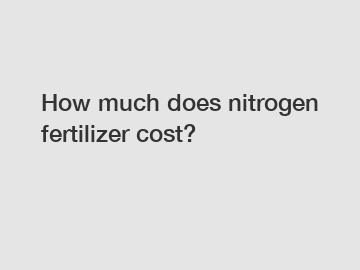How much does nitrogen fertilizer cost?
How Much Does Nitrogen Fertilizer Cost?
Nitrogen fertilizer is a crucial component in modern agriculture as it provides plants with the necessary nutrients to grow and thrive. However, the cost of nitrogen fertilizer can vary depending on various factors such as the type of fertilizer, the region, and market conditions. In this article, we will explore the average cost of nitrogen fertilizer and the factors that influence its pricing.
Types of Nitrogen Fertilizer.

There are different types of nitrogen fertilizer available in the market, each with its own unique characteristics and purposes. The most commonly used nitrogen fertilizers include urea, ammonium nitrate, and ammonium sulfate. Urea is a granular fertilizer that contains about 46% nitrogen, making it one of the most concentrated nitrogen sources. On the other hand, ammonium nitrate is a high-nitrogen fertilizer with approximately 34% nitrogen content. Lastly, ammonium sulfate is a nitrogen fertilizer that contains around 21% nitrogen.
Average Cost of Nitrogen Fertilizer.
The cost of nitrogen fertilizer can fluctuate significantly based on several factors. One of the primary determinants is the global price of natural gas since nitrogen fertilizer production heavily relies on ammonia, which is derived from natural gas. Changes in natural gas prices can directly impact the cost of nitrogen fertilizer. Additionally, transportation costs and market demand also contribute to the final price.
As of 2021, the average cost of urea, the most widely used nitrogen fertilizer, ranges between $300 to $400 per ton. The cost of ammonium nitrate is slightly higher, typically ranging from $400 to $500 per ton. Ammonium sulfate, although less expensive in terms of nitrogen content compared to urea and ammonium nitrate, has an average cost ranging from $200 to $250 per ton.
Factors Influencing Cost.
There are various factors that influence the cost of nitrogen fertilizer. Firstly, regional price variations can occur due to differences in transportation costs, supply and demand dynamics, and market conditions. Higher transportation costs can result in higher prices for farmers who are located in areas far from major manufacturing or distribution centers.
Seasonal demand also plays a crucial role in pricing. During peak seasons, such as spring when most farmers apply fertilizers, the demand for nitrogen fertilizer rises, leading to potential price increases. Conversely, during low-demand periods, prices may drop as suppliers aim to reduce their inventories.
In addition, unforeseen events or disruptions along the supply chain, such as natural disasters or geopolitical conflicts, can impact the availability and cost of nitrogen fertilizer. For example, if a major fertilizer production facility experiences a shutdown, it can disrupt the overall supply and potentially drive up prices.
Closing Thoughts.
In conclusion, the cost of nitrogen fertilizer varies depending on factors such as the type of fertilizer, regional differences, market demand, and supply chain disruptions. On average, urea costs between $300 to $400 per ton, ammonium nitrate costs between $400 to $500 per ton, and ammonium sulfate costs between $200 to $250 per ton.
It's important for farmers and industry professionals to stay informed about the current pricing trends and factors influencing the cost of nitrogen fertilizer. For more information or assistance in understanding nitrogen fertilizers and their costs, please feel free to contact us.
[Contact Us].
For more information, please visit NPK Liquid Fertilizer, npk 15 15 15 fertilizer, 10-52-10 fertilizer.


